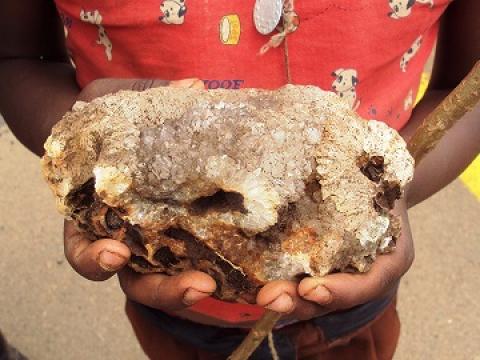As El Nino deepens impact, children in Lesotho sell stones to survive

It was three o’clock in the afternoon on a Friday. Two boys were standing on the road holding shiny things in their hands. Friday is a busy day because people are on their way home from work. Out of curiosity, some people stopped to look at what they have and found they are holding stones collected from nearby rivers. The colored stones are usually used by homeowners for landscaping.
Leteba, 16, and younger brother Pule, 13, has now resorted to selling stones hauled from the river to survive. “This is the only way for us to survive. We have nothing to eat. Since the drought my mother left us two months ago to look for employment in South Africa. She never returned home”, Leteba said. He also added that for few days they knocked at neighbors’ homes to ask for help and food. They later stopped after realizing they are in the same situation.
“Our neighbors have nothing to give to us. They have to keep whatever they have to save their families from hunger. The drought is making people panic. “We kept asking until we could not do it anymore. When we learned that people are interested in stones for landscaping, we thought we could take a chance”.
Letebe said, “A big stone costs R5.00 ($0.31) that cannot even buy a bread. A small one costs R2.00 ($0.14). Often, we stand here the whole day but nobody is interested and we go home empty-handed.” Their unemployed father left the family for almost six month nowas the situation worsened from lack of food and clean water that has worsened because of the drought. Many Basotho (as the local population are referred to)depend on subsistence farming for survival just like the family of Leteba and Pule but the recent drought forced many to abandon farming as a means for survival .
The worsening food insecurity caused by El Nino in Lesotho has forced many children to go out in the streets in search for food and other basic necessities to survive. Lesotho has had intermittent showers recently but this also camouflaged the crisis in the affected communities. People have abandoned farming in the rural areas.Prices of food in the country have more than doubled thus making life more difficult for many. Many parents were forced to leave their families in search of employment in the neighboring country South Africa. It has also forced children out of their homes in search of food and some form of living. But the heaviest toll were on children who have to fend for themselves when they were left behind by their parents.
World Vision has been working with the government’s Disaster Management Authority, UN agencies and civil society organisations for the need to work together to help those affected by the El Nino. The efforts worked and led for the government to declare the State of Emergency on December 2015 appealing for humanitarian assistance.
The United States Embassy in Lesotho pledged $50,000 and is working with World Vision to provide water tanks for roof water harvest to farmers. The area development programs are also supporting communities with food packages and winter seeds. The recently published multi-agency assessment report estimates that 532, 032 people have been affected out of the population of 1.942.008 (Lesotho demographics report 2015). In its declaration, the government said the country needs $38 million and can only provide $10million which has been distributed to line ministries.
